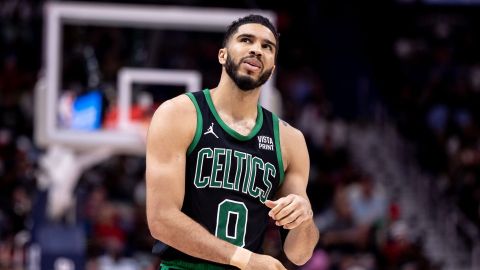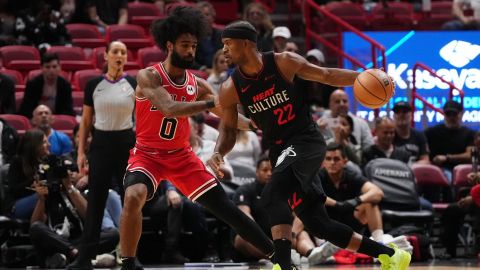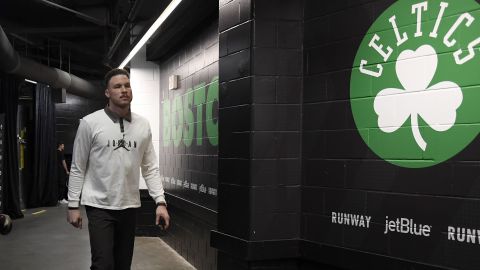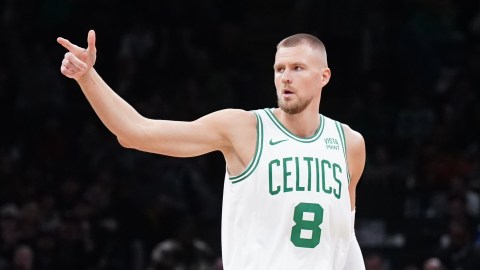 There aren’t a lot of players like Paul Pierce, guys who give their all to one franchise, never have a tiff with a coach, never find themselves in the wrong place at the wrong time and never, ever consider demanding a trade when the going gets tough.
There aren’t a lot of players like Paul Pierce, guys who give their all to one franchise, never have a tiff with a coach, never find themselves in the wrong place at the wrong time and never, ever consider demanding a trade when the going gets tough.
There aren’t a lot of players like that anymore, because Pierce isn’t one of those players, either.
Ever since the epic title run of 2008 and the valiant end to his Celtics career, Pierce has often been portrayed as the guy who “did it right.” Former coach Doc Rivers loved to say how Pierce “could have gone somewhere else, but he chose to stay here and win here,” presenting Pierce as the anti-LeBron James or anti-Carmelo Anthony. It fits a narrative and makes Pierce out to be the good guy, so most of the folks associated with the Celtics shrug and go along with it. Hey, nobody complains about inaccuracies when being praised.
Now Pierce is gone, though not by his own choice, and a lot of people seem to be wringing their hands over the new face of the franchise. Rajon Rondo is difficult to deal with on a day-to-day basis, unpredictable when an official’s call or the course of play goes against his liking and, presumably, not worthy to pick up Pierce’s mantle as The Next Great Celtic. It would all be worrisome, for sure, if the Pierce portrayal were entirely true.
In a way, the concept of Pierce as the noble star who rebuffed offers to play elsewhere and stubbornly remained with one team out of loyalty is somewhat accurate. Pierce never actually, truly wanted to leave Boston — at least not after the first few years, when the lifelong Lakers fan chuckled at the irony every time he pulled on that green jersey. His preference, he has said, was to win a championship in Boston. With Antoine Walker, Kenny Anderson and Eric Williams, Pierce came a lot closer to doing that than he’s often given credit for, taking the Celtics within two games of the NBA Finals in 2002. His early years in Boston were not without discord, though, and that is often forgotten when telling his story.
There were early growing pains with coach Rick Pitino and the stabbing incident in 2000. He had his reported clashes with Jim O’Brien and even Rivers, and by late 2007 trading Pierce seemed as likely a path for Celtics president of basketball operations Danny Ainge as the two trades for Kevin Garnett and Ray Allen that he would pull off that summer. A lot of the same fans who indignantly yell, “Trade Rondo!” now were once yelling “Trade Paul!” They know who they are, although they will never admit it.
The thing is, Pierce grew up. We all watched it. As he aged into his 30s, he spent less time at nightclubs, which invite trouble for rich, high-profile celebrities like professional athletes. He didn’t throw a temper tantrum when he failed to get the ball on the final possession, although he still wanted the ball in such situations. He became “The Captain.” He went from being a young man to the man. One day, he will come back to TD Garden to raise his No. 34 to the rafters.
This is not to say Rondo will follow Pierce’s path. Rondo is not Pierce. His career trajectory thus far is very different than the first seven years of Pierce’s career. It is a virtual certainty Rondo will never match Pierce’s level of excellence in his prime, and that is nothing to be ashamed of. For all the criticism directed at Pierce in the first half of his career — that he was a selfish one-on-one player who would never win anything — much of it was unwarranted, just as much as the criticism Rondo receives now is based as much on misunderstanding as on actual fact.
People change, and with them perceptions change. Pierce is universally beloved among Celtics fans now. Many of them will even find themselves outwardly rooting for the Brooklyn Nets next season, just because their old favorite, Pierce, will be chasing a second ring. As Pierce’s tenure in Boston comes to a close, his legacy is not that of the loyal star who always did what was right. His legacy is that sometimes greatness takes time to develop, and that the package it comes in may not be obvious from the start.
Have a question for Ben Watanabe? Send it to him via Twitter at @BenjeeBallgame or send it here.



